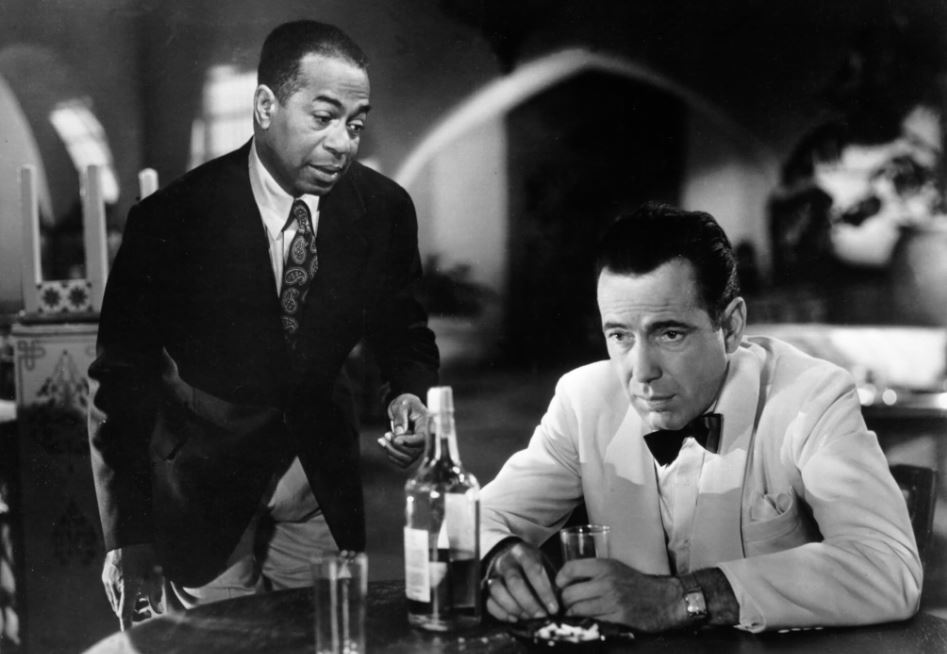
The summer of 1942. America was getting its ass handed to it in the Pacific by Yamamoto, about six million boys were now in uniform facing certain death (and eating three meals day, that’s a window into the depression, when asked what they liked about military life the biggest praise from G.I.s is that for the first time in their life they weren’t going to bed hungry), the Army Air Force was over Germany getting chewed to bits by ace Stukka pilots and other than USO shows, nifty duds and that three meals-thing, America felt like it’s dog just got run over by an ice cart.
Not to mention, like a giant pair of pinking shears, the Blitz made islands of the oddest places. One of those places being French North Africa. If you were in France and weren’t a smiling, hat-wringing supplicant, you got your ass out of France. Perhaps the French are treated too harshly for their behavior during the war, often characterized as spineless capitulators, it could be that they were operating on a same-shit-different-day Continental attitude borne from a thousand years of constant conflict, after all; knightly chivalry was invented so that yeah, we may fight, but we’ll live through it so we can fight another war sometime down the road—I occupied you yesterday, you occupied me today, someday you’ll go home, a period of farming and cheese-making will commence and then we’ll fight again.
So, when the Germans took over the north of France and the ‘free French’ formed the ‘Vichy’ government, maybe it’s not so weird that they acted like old school chums with bad blood over a girl that was now fat. Or they were just spineless capitulators (it’s really up to interpretation).
But the Vichy, being the ‘real’ French government in exile, still administered the southerly, outer-reaches of their former empire like Algiers and Morocco, where our story takes place, in Morocco’s capital, Casablanca.
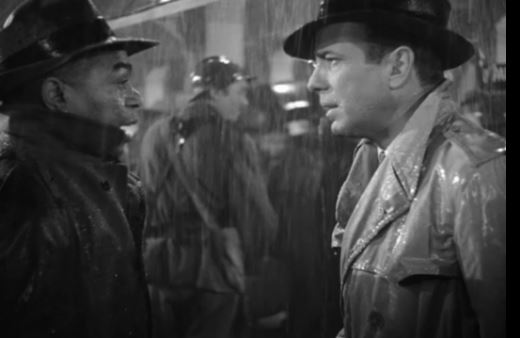
The inciting incident: two German couriers (carrying what and to whom is never mentioned) were murdered on a train to Casablanca…not an airplane or a boat…which…would…be the way you—nevermind! trains are sexy, so: couriers get murdered and taken off the bodies were two ‘Cheap Literary Devices’, excuse me, I mis-wrote that, I meant “Letters of Transit”.
Why were they ‘cheap’? because they didn’t exist, they never existed. The Third Reich did not issue Wonka-esque Golden Tickets that couldn’t be questioned even if you were holding sparklers in an Uncle Sam hat with a T-shirt that read ‘Adolf has one testicle!” Didn’t, wouldn’t, couldn’t happen.
But it’s movie, so let’s say it did.
Casablanca is a hornet’s nest of thieves and cutthroats, as one of my favorite characters, the pickpocket, says “Be careful, there are vultures, vultures everywhere,” as he deftly lifts the billfold of an English Gentleman. Indeed, this desert outpost of resentful Muslims and sweaty-breasted femme fatales is so swarming with criminals because it is swarming with those people I mentioned that had to get the hell out of Dodge after the Blitz, they had money for travel and all their possessions in a carpet—easy pickins’.
But why there? Why Casablanca?
Because it’s still in Vichy hands and a plane could be gotten to Portugal, a neutral country, and in the neutral country you could buy fare on a ship to the States. But there were only so many planes and so many seats on those planes, and because the demand was so high and circumstances so desperate, they were prohibitively expensive.
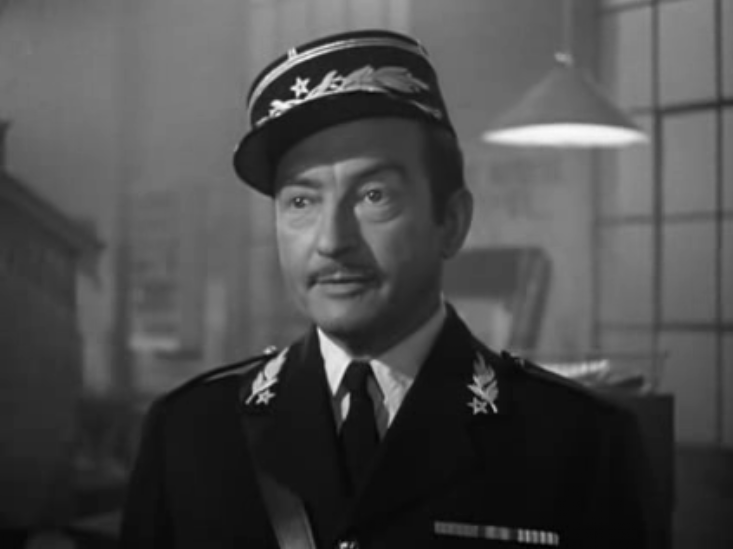
Of course, the local Gendarme could get you on at a cut rate, if you were a pretty girl and didn’t mind hot wine breath in your face as a diminutive Frenchman plowed your back forty–and that fine gentleman was played by Claude Rains! As much a crook as the fiends he claimed to corral, he felt the heat from the Nazis, who strode into town like they owned the place, asking him just what he intended to do about their dead couriers and their ‘magic’ letters of transit. They’d be worth a lot of money in open trade, would there be a place where such a hot item could be reasonably marketed?
Why, yes. Rick’s.
Humphrey Bogart’s Richard Blain was like everybody else, an exile from occupied Paris, but he opened a ‘saloon’ rather than run back to the States (I never figured out the difference between a bar, a nightclub and a saloon) called ‘Rick’s Cafe Americain’. I didn’t see much coffee drinking, but there was food and there was gambling and there was a black guy at the piano: Rick’s fellow outcast and his associate from Paris, Sam, played by Dooley Wilson, whose rendition of As Time Goes By is the musical spine of the entire picture, variations of which were woven into the score.
Rick is a haunted character, you believe he ran guns in Ethiopia, or fought for the loyalists in Spain, as is revealed in his first meeting with the Head Nazi, played by Conrad Veidt, you believe, as Rick says, that it was for money, but you also believe that it wasn’t so much for money when Captain Louis Renault (Rains) says ‘The winning side would have paid you much better.”
Captain Renault hates sentimentality, he despises the patriot, the altruist, to him everything is money and pussy and if your interests extend beyond these you’re basically a girl.
He suspects Rick of this thought-crime.
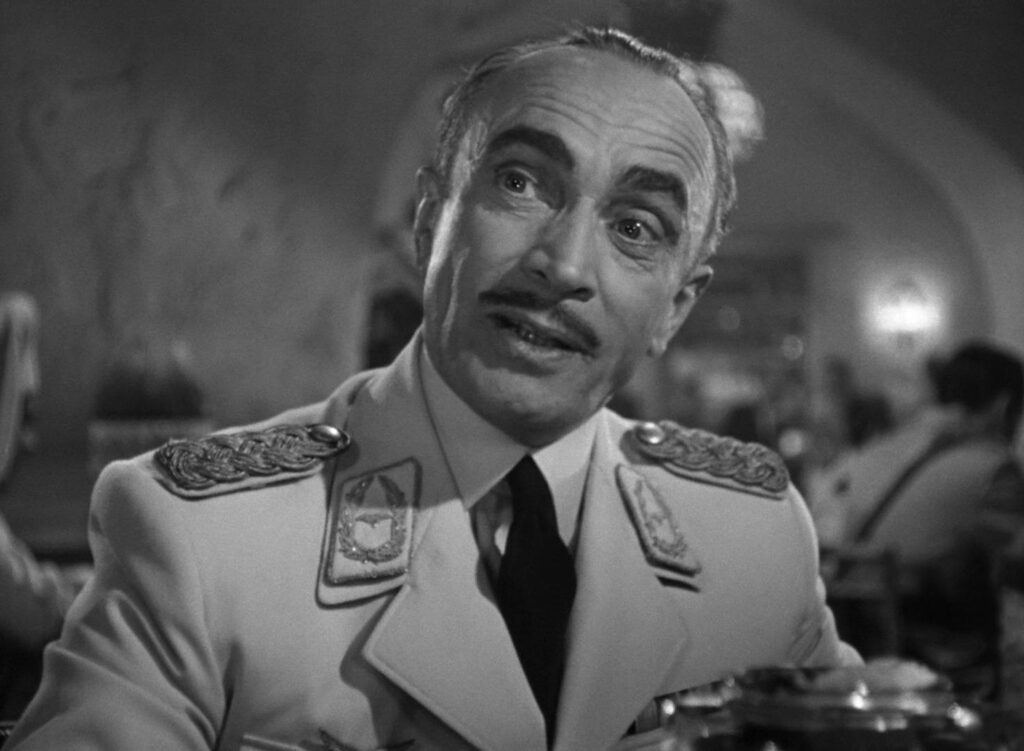
But Rick regularly bribes him, so, he ain’t all bad. And a mention of the briefly appearing Peter Lorre, the actor himself exactly like the people in the film, a castaway form Nazi Germany, except unlike the people in the film he actually made it to the States. He plays the rodent-like Mr. Ugarte, the man who murdered the couriers and wants his buddy, Rick, to hide the letters of transit for him until he can find a buyer, Rick does this, hiding them in Sam’s piano, but then, so Major Strasser can see, Captain Renault stages his arrest in Rick’s saloon. “Help me, Rick, help me!” Rick is fond of saying that he sticks his neck out for nobody, and he certainly doesn’t when his friend is hauled away and ‘commits suicide’.
That night, after this piece of theatrical corruption occurs, in steps Victor Laslow and his wife, this second point on Major Strasser’s agenda, the arrival of the escaped resistance fighter, now temporarily safe in Vichy territory. The town’s abuzz with this Saint of War’s arrival, he should have come in on a donkey, they would have thrown palm fronds in his path. But what he can’t conceive is that his beautiful wife, Ingrid Bergman, knew Rick…in Paris…like, in a marital way…while he was in a concentration camp. She can be forgiven for playing the field because she thought he was dead, but Rick’s haunted face tells a different story, see she was supposed to leave with, instead he left with a Dear John note and no explanation. She talks to Sam, asks him to play As Time Goes By, Sam pretends he doesn’t remember it then basically begs her to leave because ‘You’re no good to him.” This is what really haunts Rick, his broken heart.
Then he sees her as Sam plays the song, which was their song—cue musical string as their eyes met. The look in his eyes: Girl, you done me wrong!
As any tough guy with a broken heart does, he drains a bottle of rotgut after closing hours as Sam tries to get him to go out with him for a couple of days, but no, she’ll come, he knows she’ll come.
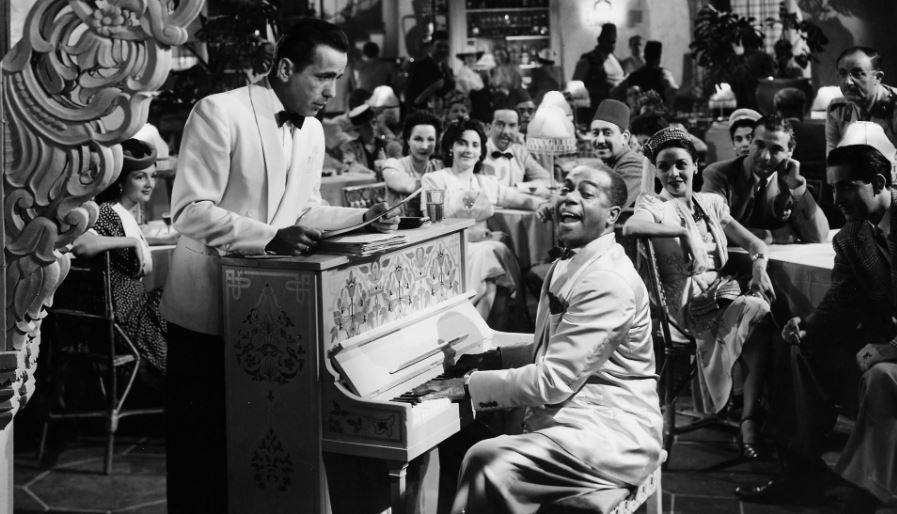
The dialog was different but this is what I heard:
“Girl, you done me wrong!”
“I couldn’t help it baby. My boo was still alive.”
“You say you love me, girl!”
“I do, baby, but he my boo!”
“I don’t think I forgive you.”
“I’ll stay wit’ you and be yo’ bitch, if’n you give us them ‘Cheap Literary Devices’ so’s he can do his work.”
“You be my bitch?”
“I be yo’ bitch.”
“Kay then.”
Warning: Do not listen to hip-hop or every movie starts sounding like this.
So, a love triangle now develops. Victor and Rick have a heart to heart, two haunted men:
“I think my bitch in love with you!”
“She say that?”
“A nigga know this shit about his bitch.”
“I’m gonna give you them ‘Cheap Literary Devices’”
“I can’t do my work without my bitch.”
“Take it easy, Jeezy, I don’t believe dat bitch no how. But I like you, so meet me at the plane.”
“You tell my bitch this?”
“Naw, sho’ty. I wait. Get her all packed up, I’ll send her on.”
“You my nigga.”
“Get on, now. I’m haunted and I need to brood about my sacrifice.”
Loses something in translation, doesn’t it?

Captain Renault is forced at gunpoint to call the airport and tell them not to screw with the two people with the Letters of Transit, but instead of calling the airport, the unsentimental Frenchy calls Major Strasser, who shows up. Cue gunfight.
I won’t tell you what happens after, but considering this is a Hollywood picture in a time of war, You can guess where the story went: hope.
Hope and a hill of beans.
Watch this movie. Not only because in hindsight, with the outcome of the war still up for grabs, it’s an interesting view where everyone’s head was. I learned a lot I wouldn’t have learned from history books, just because of the choices the writers and actors made. It’s a romance movie and so had me, an unromantic, squirming, yelling “Get back to the Nazis!” it is also a thriller with all the chewy historical plot points that make movie geeks drool.
Watch it for the snappy writing. The Epstein brothers, script doctors of old, penned some of the most quotable lines of any film:
Of all the gin joints, in all the towns, in all the world, she walks into mine.
I think this is the beginning of a beautiful friendship.
Here’s looking at you, kid.
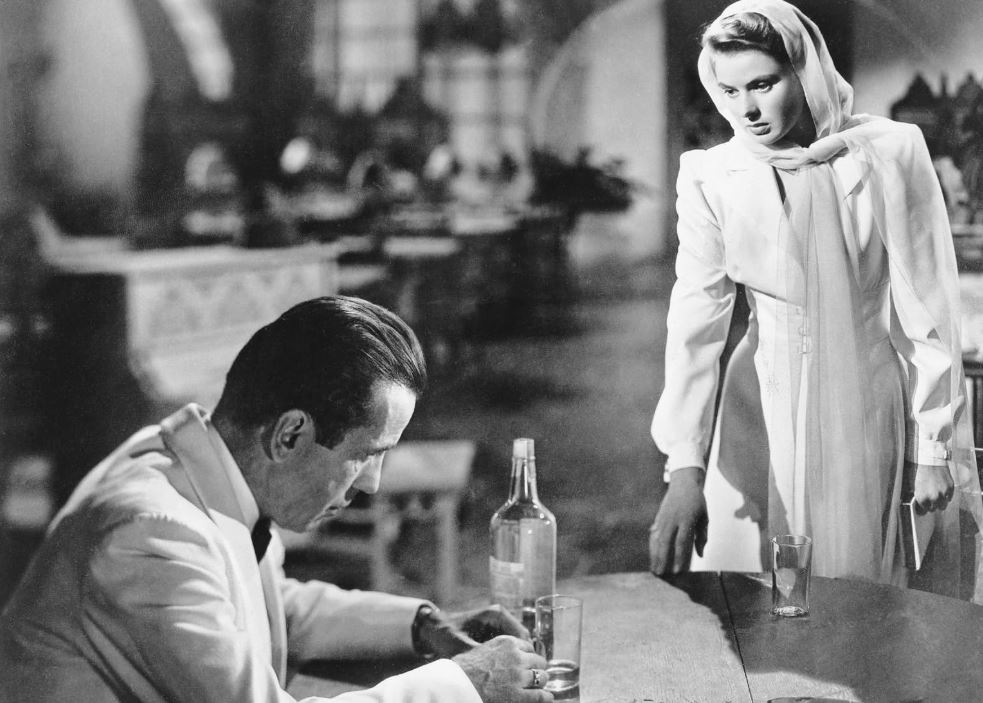
What is your nationality?
- I’m a drunkard
Where were you last night?
- That’s so long ago, I don’t remember.
Will I see you tonight?
I never make plans that far ahead.
RICK: How can you close me up? On what grounds?
- RENAULT: I’m shocked! Shocked to find that gambling is going on in here.
[a croupier hands Renault a fistful of cash]
Your winnings, sir.
RENAULT: Oh, thank you very much.
UGARTE: You despise me, don’t you?
- RICK: If I gave you any thought I probably would.
Now, despite collective memory, Bogart never said ‘Play it, again, Sam.’ What he actually said was, “Nigga, play ‘dat shit! My heart, nigga, my heart!”
But people ‘hear’ it the way they want to, so, you know…
Leave a Reply